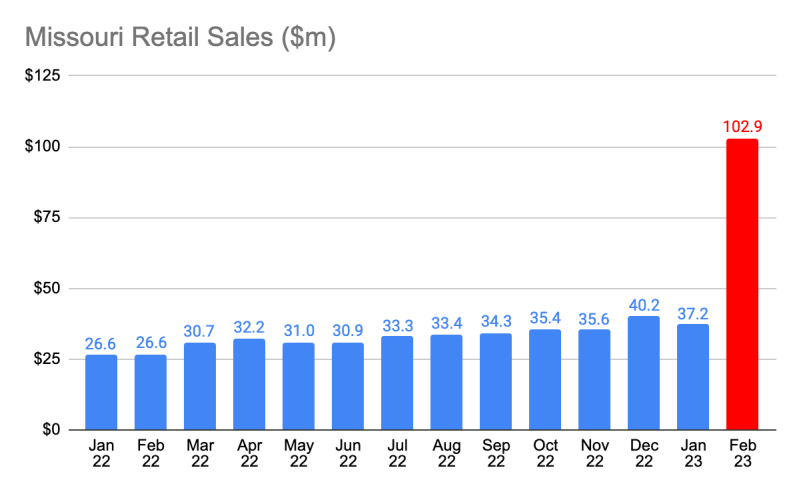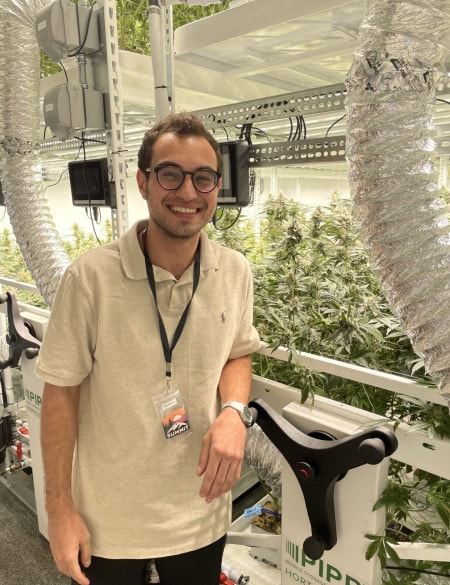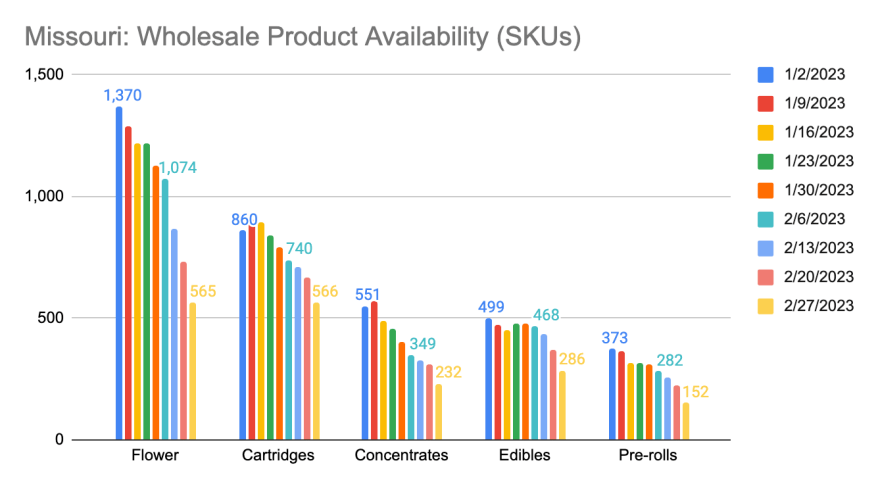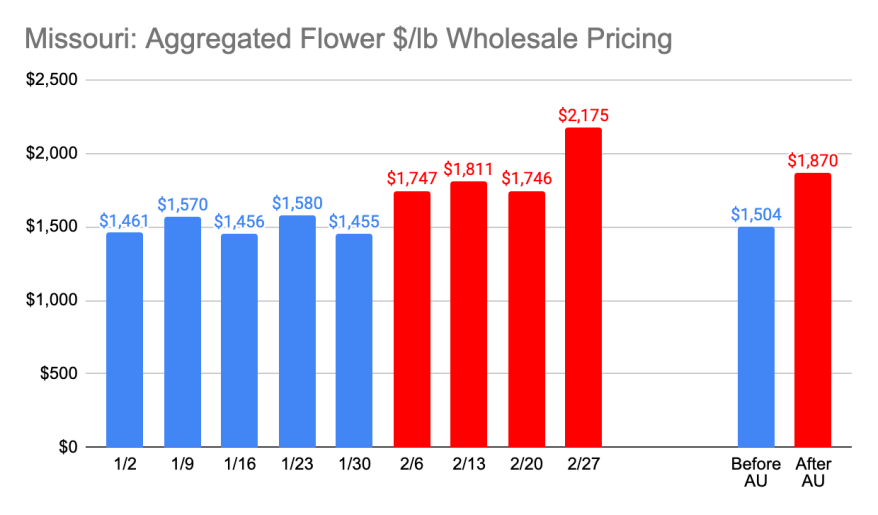- Home | News & Issues |
- After One Month, Missouri Becomes a Top Cannabis Sales State
After One Month, Missouri Becomes a Top Cannabis Sales State Surging Sales and Limited Capacity Push Prices Higher ... At Least Temporarily
Published March 14th, 2023 at 6:00 AM
Above image credit: The Lucky Leaf Expo, a business-to-business adult-use cannabis conference, is coming to Kansas City for the first time March 24-25. (Cody Boston | Flatland)Ben Burstein, a strategy analyst at LeafLink, has recently become enamored by Missouri’s cannabis market.
“I think Missouri is the most fascinating, interesting market in the country today,” Burstein said.
In February, Missouri posted just under $103 million in legal adult-use marijuana sales (both medical and recreational). Burstein said it paralleled numbers in Illinois, a much larger and more established market.
“For a state that just went adult use this year, that’s unheard of, unexpected, a complete surprise,” Burstein said.
Missouri has not only seen huge numbers in sales and customers during its first month, according to LeafLink, wholesale pricing for marijuana flower has increased by almost 50%.
By Burstein’s projections, Missouri’s recreational program structure and geographic placement in a region of weed-less states, will make the Show-Me State rise to one of the top five states in the country.

Burstein attributes Missouri success in the past month to two factors.
First off, the program’s structure allowed almost instant retail opportunities by licensing the existing medical businesses.
Second, Missouri is almost entirely bordered by states without legal markets. The only bordering state with a recreational program, Illinois, has significantly higher prices and taxes.
This allowed Missouri the third-largest first month of recreational sales, behind only California and Arizona.

Burstein said adult-use sales (based on trends in other states) continue to grow after the first month.
“If it follows some of the patterns that other states have seen — if you continue getting a lot of your traffic from outside of Missouri, the state could do $2 billion in sales next year,” Burstein said.
Those are big numbers, which equate to copious amounts of cannabis.
Missouri cannabis companies started preparing this summer for the onslaught — and more seriously following the November elections.
This meant maximizing cultivation sites, hiring more people, buying new processing equipment and renovating dispensaries to accommodate larger crowds.
When Missouri issued its comprehensive licenses a couple of days ahead of schedule (Feb. 3) the flood gates opened.
Diana Coats, vice president of operations for Good Day Farm in Missouri, said she had dispensaries almost immediately requesting emergency orders to fill the gaps.

“We were really instigating our team to make sure we were getting from the cultivation side, not just to our stores, but stores across the state who carry the Good Day Farm family of products,” Coats said.
In the first month, Coats said wholesale products have seen triple the sales of December and January. Certain dispensaries — ones that happen to be closer to state lines — have seen almost six times the sales compared to pre-adult-use months.
“It’s really exciting,” Coats said of the state’s adult-use debut month.
Good Day Farm has dispensary locations across Missouri and operations in Arkansas and Mississippi as well. Coats echoed the sentiments of Burstein and said Missouri is the most interesting state right now.
The increased demand has depleted wholesale inventory.
LeafLink facilitates wholesale transactions between brands and dispensaries. From the beginning of February to the end of the month, it reported that flower inventory dropped 50%.
It’s a good problem to have. Scarcity drives up wholesale prices, Burstein said, and ultimately makes for a thriving market.

While no one expected Missouri’s sales to be this high, the program was structured with these limitations in mind.
The state of about 6 million people has about 50 licensed cultivators with 30,000-square-foot facility caps, serving almost 200 dispensaries.
States without canopy or licensing limitations such as Arizona, which allowed for unlimited canopy space, quickly find themselves in an oversaturated market, with declining wholesale prices.
“What’s happened now is that Arizona prices have actually fallen the most of any market over the last year, because all of these limited operators have been able to produce at unlimited canopy capacity,” Burstein said.
Burstein applauded Missouri regulators for a program that not only rolled out quickly but had a balance between supply and demand.
“It’s one of the healthiest states in the entire country right now. And that really says a lot,” Burstein said.

But with all this demand, is Missouri going to run out of weed?
Probably not.
David Craig, the vice president of marketing for Illicit, said the cannabis brand started ramping up production in November, as soon as Amendment 3 passed.
“But in terms of what expectations were, and how it actually turned out, I think everyone in the industry was a little bit surprised,” Craig said of the first month of sales. “It’s a few times (busier) than I think anyone anticipated.”
Under the medical only program, Illicit, and most cultivators, operated below capacity. Now these brands are maxing out their allotted spaces.
Even still, it takes about four to five months from initiation for a cannabis product to reach a dispensary shelf.
Craig said by April the additional cultivation efforts made by Illicit and other cultivators will have filled in the supply gaps.

But consumers will only increase. According to the 2023 annual cannabis report by New Frontier Data, the cannabis consumer base will grow by roughly 4% each year for the next eight years.
Cultivators can augment to meet current demand, but only to a certain extent. Over the next couple of years as the state issues new licenses there will still be a need for more cultivators.
“I think they will very easily be able to find a good spot in the market,” Craig said. “I think there’s plenty of room.”
Consumers can rest easy too.
Burstein said the increase in wholesale prices might temporarily cause higher prices at the dispensary, but overall Missouri’s prices are in line with other markets.
Coats with Good Day Farm said the company hopes it can keep dispensary prices at current rates.
And Illicit has no plans to raise prices.
“Illicit has taken no measures to increase our pricing in any way,” Craig said. “We do not intend (to). The whole point of this thing was to make it accessible for everybody.”
Cami Koons covers rural affairs for Kansas City PBS in cooperation with Report for America. The work of our Report for America corps members is made possible, in part, through the generous support of the Ewing Marion Kauffman Foundation.
Tags: adult-use marijuana • cannabis • Good Day Farm • Illicit • LeafLink • marijuana • Missouri • Recreational Marijuana
Like what you are reading?
Discover more unheard stories about Kansas City, every Thursday.
Thank you for subscribing!
Check your inbox, you should see something from us.
Ready to read next
Kansas City Election Guide: What Voters Should Know About the April 2023 Ballot
Kansas City voters are narrowing the field for mayor and city council seats in redrawn council districts. Plus, residents will decide whether to approve taxes on recreational marijuana and Airbnbs.
Read StoryRelated Stories
As Few as 1 in 5 Voters Could Defeat Initiative Petitions Under Missouri Senate Proposal
The legislation set for debate in the Senate would require a majority vote in 82 state House districts and a statewide majority to approve constitutional amendments.
by Rudi Keller, Missouri Independent | 02-05-2024


